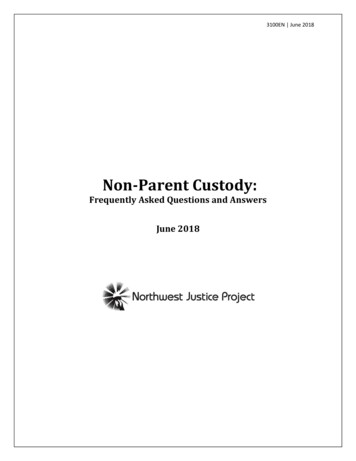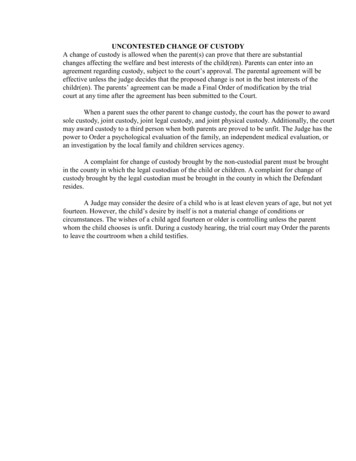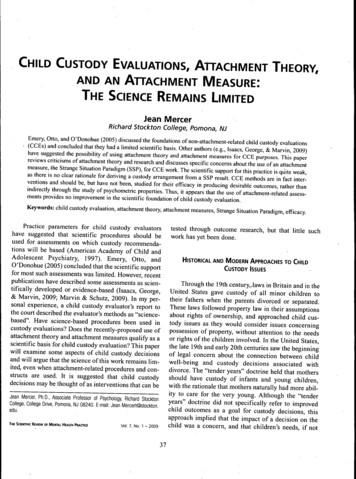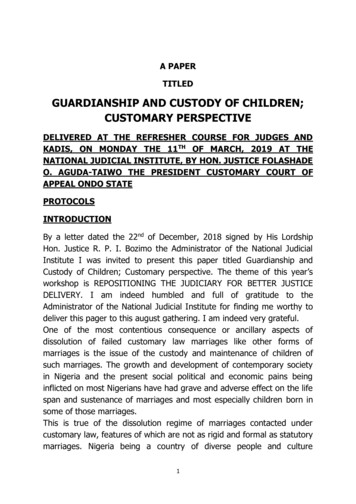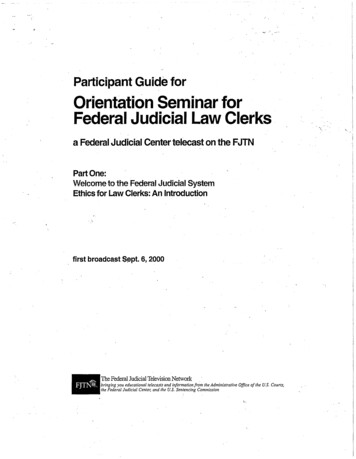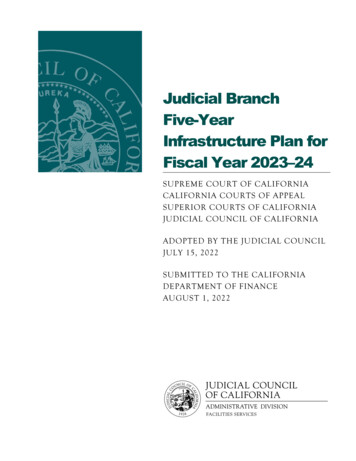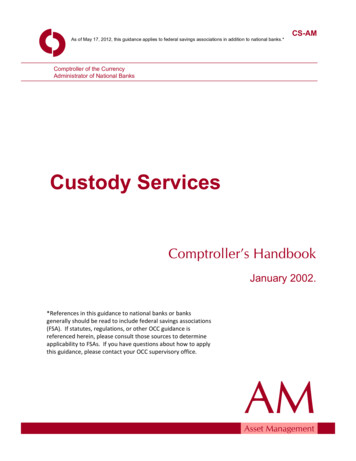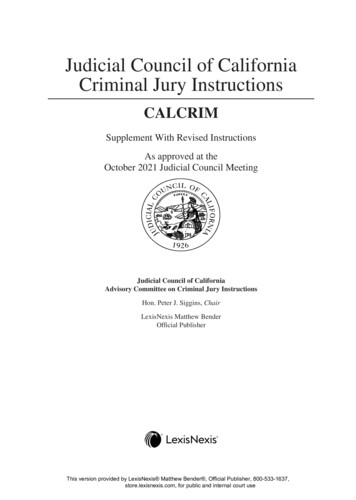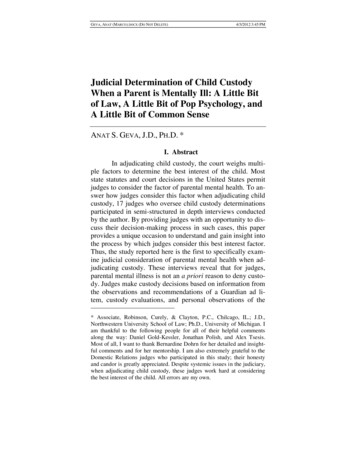
Transcription
GEVA, ANAT (MARCO).DOCX (DO NOT DELETE)4/3/2012 3:45 PMJudicial Determination of Child CustodyWhen a Parent is Mentally Ill: A Little Bitof Law, A Little Bit of Pop Psychology, andA Little Bit of Common SenseANAT S. GEVA, J.D., PH.D. *I. AbstractIn adjudicating child custody, the court weighs multiple factors to determine the best interest of the child. Moststate statutes and court decisions in the United States permitjudges to consider the factor of parental mental health. To answer how judges consider this factor when adjudicating childcustody, 17 judges who oversee child custody determinationsparticipated in semi-structured in depth interviews conductedby the author. By providing judges with an opportunity to discuss their decision-making process in such cases, this paperprovides a unique occasion to understand and gain insight intothe process by which judges consider this best interest factor.Thus, the study reported here is the first to specifically examine judicial consideration of parental mental health when adjudicating custody. These interviews reveal that for judges,parental mental illness is not an a priori reason to deny custody. Judges make custody decisions based on information fromthe observations and recommendations of a Guardian ad litem, custody evaluations, and personal observations of the* Associate, Robinson, Curely, & Clayton, P.C., Chilcago, IL.; J.D.,Northwestern University School of Law; Ph.D., University of Michigan. Iam thankful to the following people for all of their helpful commentsalong the way: Daniel Gold-Kessler, Jonathan Polish, and Alex Tsesis.Most of all, I want to thank Bernardine Dohrn for her detailed and insightful comments and for her mentorship. I am also extremely grateful to theDomestic Relations judges who participated in this study; their honestyand candor is greatly appreciated. Despite systemic issues in the judiciary,when adjudicating child custody, these judges work hard at consideringthe best interest of the child. All errors are my own.
GEVA, ANAT (MARCO).DOCX (DO NOT DELETE)2UC Davis Journal of Juvenile Law & Policy4/3/2012 3:45 PMVol. 16:1judge, framed by “common sense.” Judges, however, tend tooverestimate their understanding of the psychological factorsrelevant to post-divorce adjustment. At the same time, they donot discharge effectively their gatekeeping role when theyconsider, without question, the evidence, opinions, and conclusions offered by evaluators. To address these problems, itis recommended that judges overseeing child custody proceedings be required to receive more effective training concerning the relevancy and significance of parental mentalhealth, understanding and applying social science and behavioral research, and evaluating expert recommendations. In addition, the law should afford such judges more latitude to consider remissions of a contesting parent’s psychiatricsymptoms. Lastly, both the law and the judges who enforce itshould presumptively afford the mentally ill parent an opportunity for rehabilitation before implementing a permanentcustody order.
GEVA, ANAT (MARCO).DOCX (DO NOT DELETE)Winter 2012Judicial Determination of Child Custody4/3/2012 3:45 PM3Table of ContentsI. Abstract .1II. Introduction .6III. General Background .9A. Child Custody Statutory Requirements .11B. Assisting the Court in Child CustodyAdjudications .14C. Considering Parental Mental Health .17D. The Nexus Requirement .201. No Nexus Identified Between ParentalMental Illness and Child’s Best Interest .212. When the Nexus is Provided, the CourtEmphasizes the Relationship betweenParental Mental Health and thePsychological Best Interest of the Child. .233. The Court May Consider the Nexusbetween Parental Mental Health and thePhysical Best Interest of the Child. .24IV. Methods .25A. Participants .25B. Length of Interview .25C. Interview Instrument .25V. Results .26A. General Thoughts Regarding Child CustodyDeterminations .26B. Nature of Custody Awarded .28C. How Prevalent is Parental Mental Illness inContested Child Custody Disputes? .29D. In Child Custody Disputes, What Are theMental Health Issues that the Judge Observes? .301. Bipolar Disorder.312. Suicidality .323. Munchausen by Proxy.33
GEVA, ANAT (MARCO).DOCX (DO NOT DELETE)4UC Davis Journal of Juvenile Law & Policy4/3/2012 3:45 PMVol. 16:14. Depression.33E. How Does the Presence of Mental IllnessImpact a Child Custody Decision? .34F. Nature of the Nexus.351. Physical Safety .362. Adjustment .373. Psychological Factors .38G. How Does a Judge Determine that a Parent’sMental Health is Impacting the Child’s BestInterest? .39H. The GAL or Child’s Representative.40I. The Custody Evaluation .441. When is an Evaluation Ordered? .452. How do judges use the custody evaluation? .473. How does a judge decide if the custodyevaluation is of good quality? .514. Do judges have a preference regarding thetype of professional who conducts thecustody evaluation? .55J. Judge’s Personal Observations .58VI. Discussion .60A. The Nexus between Parental Mental Healthand the Child’s Best Interest .61B. The Source of Information Considered inCustody Determinations .64C. Relying on a GAL Recommendation .64D. Custody Evaluations .661. Evaluation Guidelines are Insufficient.672. Common Evaluator Reasoning Errors .683. The Trouble with Psychological Testing .714. Valid Research Relied Upon Improperly.745. Discipline of Evaluator .77
GEVA, ANAT (MARCO).DOCX (DO NOT DELETE)Winter 2012Judicial Determination of Child Custody4/3/2012 3:45 PM5E. Common Sense Judicial Decision-Making .78VII. Modifying Child Custody Adjudications When aParent has a Mental Illness .80A. Judicial Training.81B. Rehabilitation .831. Evolving Symptoms .842. Divorce Stress .853. Rehabilitation is in the Child’s Best Interest .854. Awarding Child Custody Pending FutureRehabilitation .88VIII. Conclusion.90
GEVA, ANAT (MARCO).DOCX (DO NOT DELETE)6UC Davis Journal of Juvenile Law & Policy4/3/2012 3:45 PMVol. 16:1II. IntroductionThere is no prescribed formula for resolving contestedchild custody cases. Instead, in determining custody, the courtweighs multiple factors to determine the best interest of thechild.1 In the United States, one of the factors most state statutes permit judges to consider is the mental health of a parent.2 This paper focuses on the question of how, following un1Thirty-one states and the District of Columbia have statutory best interest of the child guidelines. E.g., ALASKA STAT. § 25.24.150(c) (2010) (requiring court to look at best interest of child factors); ARIZ. REV. STAT.ANN. § 25-403(A) (2010) (requiring court to look at best interest of childfactors); CAL FAM. CODE §§ 3011, 3020(a), 3040(a)(1), 3040(b) (West2011) (requiring court to look at best interest of child factors); IDAHOCODE ANN. § 32-717 (2010) (requiring court to look at best interest ofchild factors); 750 ILL. COMP. STAT. ANN. 5 / 602 (West 2010); IND. CODE§ 31-17-2-8 (2010) (requiring court to look at best interest of child factors); TENN. CODE ANN. § 36-6-106 (2010) (requiring court to look at bestinterest of child factors); VA. CODE ANN. § 20-124. 3(a) (2008) (requiringcourt to look at best interest of child factors). Many states without statutory guidelines have court developed criteria. See, e.g., Mississippi, Albrightv. Albright, 437 So. 2d 1003, 1005 (Miss. 1983) (putting forward severalfactors in affirming that the polestar consideration in child custody determination is the best interest of the child); Rhode Island, Pettinato v. Pettinato, 582 A.2d 909, 913 (R.I. 1990) (identifying factors to be weighedbecause there are no statutorily defined factors that compose the best interest of the child).2E.g., COLO. REV. STAT. § 14-10-124(1.5)(a)(V) (2010) (requiring courtsto consider “mental health . . . of all individuals involved, except that adisability alone shall not be a basis to deny or restrict parenting time”);FLA. STAT. ANN. § 61.13(3)(g) (2011) (“mental . . . health of parents”);GA. CODE ANN. § 19-9-3 (a)(3) (I) (2010) (“mental . . . health of each parent”); 750 ILL. COMP. STAT. ANN. 5 / 602(a)(5) (2011) (“mental . . . healthof all individuals involved”); IND. CODE § 31-17-2-8(6) (2011) (“mentalhealth . . . of all individuals involved”); LA. CIV. CODE ANN. art 134(7)(2011) (“mental . . . health of each party”); MICH. COMP. LAWS ANN. §722.23(3)(g) (West 2010) (“mental . . . health of the parties involved”);MINN. STAT. ANN. § 518.17(1)(a) (9)(West 2011) (“mental . . . health ofall individuals involved; except that a disability . . . shall not be determinative of the custody of the child”); N.M. STAT. ANN. § 40-4-9A(5) (2010)(“mental . . . health of all individuals involved”); TENN. CODE ANN. § 366-106(a)(54) (2010) (“mental . . . health of the parents or caregivers”);WYO. STAT. ANN. § 20-2-201(a)(ix) (2009) (“ mental ability of eachparent to care for each child”).
GEVA, ANAT (MARCO).DOCX (DO NOT DELETE)Winter 2012Judicial Determination of Child Custody4/3/2012 3:45 PM7successful attempts at mediation, judges determine child custody when there is a dispute between divorcing parents andwhen there is a question about the mental health of a contesting parent.3 This paper will explore child custody determinations under the Illinois Marriage and Dissolution of MarriageAct (Marriage Act) as an illustration for understanding thefoundations and principles by which judges, in general, consider the relationship between parental mental health and thebest interest of the child.4 This statute reflects the best interestof the child approach adopted throughout the United Statesand is typical of many state statutes. The empirical study reported herein is notable because for the first time it opens awindow into decision making that is typically unavailable tothe public.To answer how judges consider parental mentalhealth, 17 judges throughout the state of Illinois, who overseechild custody determinations, participated in confidential andindividual semi-structured in depth interviews conducted bythe author. The interviews focused on uncovering the information gathering, decision-making, and reasoning process ofeach judge in determining whether a parent’s mental healthwas a relevant factor, and if so, how much weight or influencewas attributed to it in deciding child custody. The disordersand behaviors I will consider in this paper will namely involve Axis I diagnoses—namely, bipolar disorder,5 depression,6 and Munchausen by proxy,7 as well as actions related to3This paper is concerned exclusively with child custody decisions anddoes not examine judicial reasoning in determining other aspects of marital dissolution, such as child support, spousal support, the division of marital assets, and so on. This paper presumes that in the case of a disputedchild custody case, there is no occurrence of ongoing or repeated abuse ordomestic violence.4750 ILL. COMP. STAT. ANN. 5 / 101 (West 2011).5The essential feature of bipolar disorder is a clinical course that is characterized by one or more manic episodes. Often individuals have also hadone or more major depressive episodes. AM. PSYCHIATRIC ASS’N,DIAGNOSTIC AND STATISTICAL MANUAL OF MENTAL DISORDERS – IV-TR382 (4th ed., text rev. 2000) [hereinafter DSM-IV].6The essential feature of depression is a period of at least two weeks during which there is either depressed mood or the loss of interest or pleasure
GEVA, ANAT (MARCO).DOCX (DO NOT DELETE)8UC Davis Journal of Juvenile Law & Policy4/3/2012 3:45 PMVol. 16:1suicidality8—because each of the judges with whom I spokefocused primarily on custody determinations involving theaforementioned issues.9The results of these interviews indicate that judgeshave a great amount of latitude to decide whether and how toconsider the mental health of a contesting parent in adjudicating child custody and judges, though well versed in the legalcomponents of child custody determinations, generally do notpossess adequate knowledge and training to be able to makesufficiently informed decisions about the best interest of achild where a contesting parent has a mental health problem.That is, judges do not have sufficient understanding regardingthe nature of mental illness, the state of mental health research, or scientifically valid ways to assess the effect of mental illness on parenting. Judges who follow the lead of mentalhealth experts, but who are not aware of common reasoningand research errors committed by these professionals, arecommitting grave errors in determining custody. The result isthat parents contesting custody who possess mental healthproblems may lose the opportunity to parent their children,even when it is in the child’s best interest. At the same time, alack of awareness of the effects of parental mental health onchild well-being also means that granting custody to a mentally ill parent may not always be in the best interest of the child.in nearly all activities. Id. at 349.7Munchausen by proxy is not an official DSM-IV diagnosis but is a subtype of factitious disorder by proxy. The essential feature of factitious disorder by proxy is the intentional production or feigning of physical or psychological symptoms in another individual who is, typically, under theindividual’s care. Id. at 781. Commonly, the individual victim is a youngchild, and the perpetrator is the child’s mother. Id. Munchausen by proxyis a label for a pattern of behavior in which the caretaker exaggerates, fabricates, or induces physical symptoms in the child.8Typically, suicidality is associated with depression and bipolar disorder.It is also associated with borderline personality disorder, but as will bediscussed below, judges did not refer, of their own accord, to personalitydisorders during the interviews.9Although there may be parallel concerns, this paper does not discusscases in which a contesting parent’s alcohol or substance use was a primary factor of consideration in determining a custody arrangement.
GEVA, ANAT (MARCO).DOCX (DO NOT DELETE)Winter 2012Judicial Determination of Child Custody4/3/2012 3:45 PM9Possible solutions to this lack of judicial mental healthproficiency may require the court 1) to increase and changethe nature of judicial training on matters regarding child custody decisions, 2) to consider the challenges involved in modification of child custody and adopt more flexibility in childcustody determinations in order to permit contemplation ofremissions of psychiatric symptoms when the contesting andlosing parent has a mental health problem, and 3) to provide amentally ill parent with an opportunity for rehabilitation before a permanent custody order is put into place.Part I of the paper will begin with a general overviewof child custody determinations before turning to the specificconsideration of parental mental health in determining thechild’s best interest. Part II will describe the methods used inthis empirical study. Part III reports results from in-depth interviews with judges who adjudicate child custody. Part IVwill delve into and analyze the judges’ interview responsesand the core problems their answers reveal regarding custodyadjudications. Finally, in Part V, I propose some changes tothe process of child custody determinations when a parent ismentally ill.III. General BackgroundWhen parents divorce, children experience significantdisorder in family life. In most instances of divorces involvingminor children, parents reach an agreement of custody without judicial intervention. In fact, nationwide, approximately90% of custody decisions are the result of private bargainingbetween the parents.10 Although there is concern about therole of money, power, and coercion in these circumstancesinvolving a parent with mental illness, these privately settled10GARY B. MELTON, JOHN PETRILA, NORMAL G. POYTHRESS &CHRISTOPHER SLOBOGIN, PSYCHOLOGICAL EVALUATIONS FOR THECOURTS: A HANDBOOK FOR MENTAL HEALTH PROFESSIONALS ANDLAWYERS 539 (3d ed., Guilford Press 2007); see also Jay Lebow, Integrative Family Therapy For Disputes Involving Child Custody and Visitation,17 J. FAM. PSYCHOL. 181, 182 (2003) (10% of divorcing families engagethe court in dispute).
GEVA, ANAT (MARCO).DOCX (DO NOT DELETE)10UC Davis Journal of Juvenile Law & Policy4/3/2012 3:45 PMVol. 16:1custody cases are beyond the scope of this research. In theremaining instances in which custody is contested, statutoryguidelines provide judges with great discretion in determiningthe custody arrangement. There is no published statistic concerning the percentage of litigated custody disputes in whichthe mental health of a parent is a factor to be considered.Contemporary judicial decision-making doctrine hasrejected the default “tender years doctrine” which assumesthat mothers should always be awarded custody.11 Insteadchild custody determinations are made by conducting a casespecific analysis that considers which child custody arrangement is in the particular child’s best interest and welfare.12 Ineffect, the “best interest of the child” standard places greatemphasis on the psychological “best interest” of the child—afact that becomes clearly perceptible when one examines thefactors enumerated in child custody statutes.13 The majority ofjurisdictions base their best interest factors on the guidelinesproposed by the Uniform Marriage and Divorce Act (UMDA)which states that:“The court shall determine custody in accordance withthe best interest of the child. The court shall consider all relevant factors including:(1) the wishes of the child’s parent or parents as to his11See, Freeland v. Freeland, 159 P. 698, 699 (Wash. 1916) (“Mother loveis a dominant trait in even the weakest of women, and as a general thingsurpasses the paternal affection for the common offspring . . . .”).12E.g., Nye v. Nye, 105 N.E.2d 300, 303-04 (Ill. 1952); Kjellesvik v.Shannon, 355 N.E.2d 120, 123 (Ill. App. Ct. 1976); see also 750 ILL.COMP. STAT. ANN. 5 / 602(a) (2011); John A. v. Bridget M., 791 N.Y.S.2d421, 429 (N.Y. App. Div. 2005) (Sullivan J., concurring) (“Child custodydisputes, by their very nature, must be analyzed on a case-by-case basis.”);Kane v. Szymczak, 585 S.E.2d 349, 353 (Va. Ct. App. 2003) (“The trialcourt must provide a case-specific explanation (one that finds its contextual meaning from the evidence before the court) of the fundamental, predominating reason or reasons for the decision.”).13See, e.g., CAL. FAM. CODE §§ 3011, 3021(d)-(e) (West 2011) (requiringcustody and visitation determinations to be made from the standpoint ofthe child's best interest); IOWA CODE ANN. § 598.41(3) (West 2010) (custody); N.J. STAT. ANN. § 9:2-4 (West 2010) (custody).
GEVA, ANAT (MARCO).DOCX (DO NOT DELETE)Winter 20124/3/2012 3:45 PMJudicial Determination of Child Custody11custody;(2) the wishes of the child as to his custodian;(3) the interaction and interrelationship of the childwith his their parent or parents, his siblings, and any otherperson who may significantly affect the child’s best interest;(4) the child’s adjustment to their home, school, andcommunity; and(5) the mental and physical health of all individualsinvolved.”14A. Child Custody Statutory RequirementsIn Illinois, as in other states, a child custody proceeding may be commenced in the court by a parent who files fordissolution of a marriage.15 In a disputed child custody proceeding, parents are required to attend mediation before ajudge adjudicates a case.16 The court will decide custody byexamining the best interest of the child,17 and custody must be“resolved within 18 months from the date of service of the petition or complaint to final order.”1814UNIF. MARRIAGE & DIVORCE ACT, § 402, 9A U.L.A. 561 (1998); Analternative approach is the Approximation Standard in which postdivorcecustody parallels predivorce parental care as much as possible. PRINCIPLESOF THE LAW OF FAMILY DISSOLUTION § 2.08 (2002). This standard requires that a custody arrangement mirror, as closely as possible, the division of caregiving and childrearing responsibilities before the divorce. According to this approach, the child’s psychological attachments and needsare not central to the decision-making. MELTON ET AL., supra note 10, at546.15750 ILL. COMP. STAT. ANN. 5 / 601(b)(1)(i) (2011). In some circumstances, persons other than the biological parents may seek custody. Forinstance, stepparents and grandparents meeting the statutory requirements,may seek custody. See 750 ILL. COMP. STAT. ANN. 5 / 601(b)(2-4) (2011).This paper assumes that the dispute is between two parents who, prior topetitioning for divorce, shared child custody.16ILL. SUP. CT. R. 905 (2010).17750 ILL. COMP. STAT. ANN. 5 / 602(a) (2011).18ILL. SUP. CT. R. 922 (2011). Note that if the court believes it is in thebest interest of the child, it may award joint custody. 750 ILL. COMP. STAT.ANN. 5 / 602.1(b) (2011). This may be either in response to a parental pe-
GEVA, ANAT (MARCO).DOCX (DO NOT DELETE)12UC Davis Journal of Juvenile Law & Policy4/3/2012 3:45 PMVol. 16:1The Illinois best interest of the child guidelines arebased on the UMDA factors and provide judges with the following factors:“The court shall determine custody in accordance withthe best interest of the child. The court shall consider all relevant factors including:The wishes of the child’s parent or parents as to hiscustodyThe wishes of the child as to his custodianThe interaction and interrelationship of the child withhis parent or parents, his siblings and any other person whomay significantly affect the child’s best interestThe child’s adjustment to his home, school and communityThe mental and physical health of all individuals involvedThe physical violence or threat of physical violence bythe child’s potential custodian, whether directed against thechild or directed against another personThe occurrence of ongoing or repeated abuse . . .tition or on its own motion. Id. There is no presumption for or against jointcustody. Id. at 5 / 602.1(c). The statute does not define “joint custody,” butit has been understood to mean that both parents make major decisions together regarding the child. See also, In re Marriage of Seitzinger, 775N.E.2d 282, 287 (Ill. App. Ct. 2002) (“Joint custody should be awardedonly where the evidence indicates the parents are willing to cooperate inthe upbringing of their child.”); Gemma B. Allen, Survey of Illinois Law:Family Law, 19 S. ILL. U. L.J. 819, 843 (1995). Generally, in a joint custody agreement, one parent will have residential custody and the other parent will have visitation (per a parenting plan). Allen, supra, at 843. Suchan arrangement, however, does not mean equal parenting time. 750 ILL.COMP. STAT. ANN. 5 / 602.1(d) (2011). In order for the court to order jointcustody, it is presumed that the parents can “cooperate effectively andconsistently” in order to promote the best interest of the child. Id. at 5 /602.1(c)(1). Other factors the court considers are: “(2) The residential circumstances of each parent; and (3) all other factors which may be relevantto the best interest of the child. Id. at 5/602.1(c)(2)–(3).” In contrast, insole custody, only the custodial parent has major decision-making capability. Id. at 5 / 602.1(b).
GEVA, ANAT (MARCO).DOCX (DO NOT DELETE)Winter 2012Judicial Determination of Child Custody4/3/2012 3:45 PM13The willingness and ability of each parent to facilitateand encourage a close and continuing relationship betweenthe other parent and child; andWhether one of the parents is a sex offender.”19The Illinois statute provides further that these factorsmay only be considered if they affect the relationship of theparent to the child. 20Though these guidelines have a great deal of face validity and are intuitively appealing, no direction is provided tothe court for applying these factors to specific cases. The statute does not offer the court any insight into when particularfactors should be considered, and if so, how much weight togive to each factor considered. Indeed, it has been argued thatthe standards are ambiguous, too vague, and without concreteguidance as to their application, and accordingly, child custody determinations are particularly vulnerable to judicial idiosyncrasies and biases.21 Without standardized and objectivenorms for determining custody, it becomes very hard to control for judicial bias when it comes to decisions involvingmental disability.22 This is especially the case, if inherent tothe court is an unwitting value judgment that mentally ill par19750 ILL. COMP. STAT. ANN. 5/602(a) (2011).Id. at 5 / 602(b) (“The court shall not consider conduct of a present orproposed custodian that does not affect his relationship to the child.”). Thestatute does not explain what is meant by the “relationship to the child.”21ROBERT E. EMERY, MARRIAGE, DIVORCE AND CHILDREN’SADJUSTMENT 114 (2d ed. 1999) (identifying the problem with the best interest factor as that because it leaves such a high level of discretion in thehands of the judge, there is little predictability); MELTON ET AL., supranote 10, at 544 (“Lack of statutory guidance may make subjective influences about ‘best’ outcomes inevitable. . . . [B]est interest is at least asvalue-laden and unscientific as other legal determinations . . . .”); PaulAmato, Divorce and the Well-Being of Adults and Children, 52 NAT’LCOUNCIL ON FAM. REL. REP. F3, F4, F18 (2007) (explaining that there isno ‘one size fits all’ solution to custody after divorce, making it difficult tosay what the legal policy should be with respect to custody or visitationarrangements).22Megan Kirshbaum, Daniel O. Taube & Rosalinda Lasian Baer, Parentswith Disabilities–Problems in Family Court Practice, 4 J. CENTER FORFAMILIES, CHILD. & COURTS 27, 28 (2003).20
GEVA, ANAT (MARCO).DOCX (DO NOT DELETE)14UC Davis Journal of Juvenile Law & Policy4/3/2012 3:45 PMVol. 16:1ents are not as “fit” to parent as those who are mentally “stable.”23B. Assisting the Court in Child CustodyAdjudicationsAs in other states, in order to assist the court in considering the child custody guidelines, the judge in Illinois mayappoint representation for the contested child,24 and in addition, may order a custody evaluation.25 The judge need notcompel either, and further if he or she chooses to order representation or an evaluation, it is left to his or her discretionwhether to require one or both. According to the Illinois stat23Id. at 28-29.750 ILL. COMP. STAT. ANN. 5 / 506 (2011) (“In any proceedings involving the . . . custody, visitation . . . of a minor or dependent child, thecourt may, on its own motion or that of any party, appoint an attorney toserve in one of the following capacities to address the issues the court delineates: (1) Attorney . . . (2) Guardian ad litem . . . (3) Child representative . . . .”); see also ALASKA STAT. § 25.24.310(c) (2010) (allowing thecourt to appoint an attorney or other person or the office of public advocacy to provide guardian ad litem services to a child in any legal proceedingsinvolving the child's welfare); D.C. CODE § 16-914(g) (LexisNexis 2010)(providing that in a child custody proceeding, “[t]he [c]ourt, for goodcause and upon its own motion, may appoint a guardian ad litem or an attorney, or both, to represent the minor child's interests”); WIS. STAT. ANN.§ 767.407(1)(a) (West 2010) (requiring that when custody is contested,“[t]he court shall appoint a guardian ad litem for a minor child . . . .”).25750 ILL. COMP. STAT. ANN. 5 / 604(b) (2011) (“The court may seek theadvice of professional personnel, whether or not employed by the court ona regular basis. The advice given shall be in writing and made available bythe court to counsel. Counsel may examine, as a witness, any professionalpersonnel consulted by the court, designated as a court's witness.”); seealso CAL. FAM. CODE § 3111(a) (West 2011) (“In any contested proceeding involvi
Winter 2012 Judicial Determination of Child Custody 7 successful attempts at mediation, judges determine child cus-tody when there is a dispute between divorcing parents and when there is a question about the mental health of a contest-ing parent.3 This paper will explore child custody determina-
